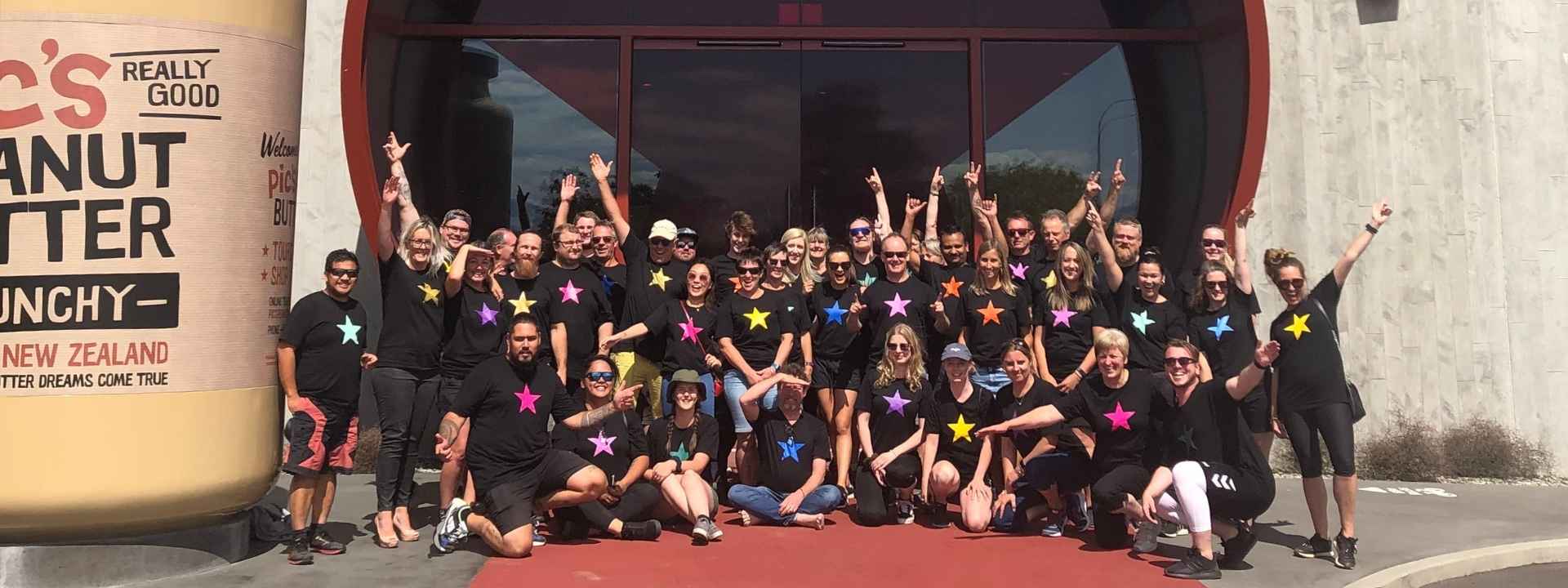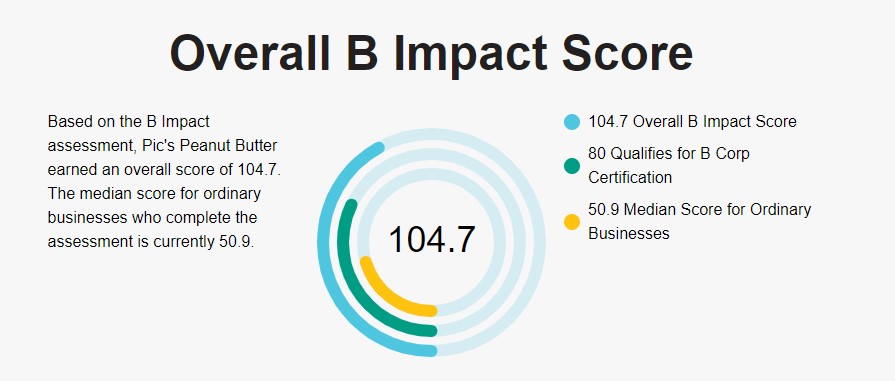Pic's get B-Corp certified!

What's a B Corp, we hear our Peanut Butter Lovers ask?
p>B Corps are companies across the world that uphold the highest standards of ethical business, in order to build a better future for all.
Pic's is one peanut butter company at the bottom of the planet, but we are committed to doing our bit, standing by our values and sharing our journey along the way.
We're transparent, accountable, and legally bound to balance environmental and social factors in our decision-making.
Like most things here at Pic's, becoming a B Corp just made sense. And we were pretty chuffed to end up with a score of 104.7 in the independent audit conducted by B Corporation: Australia & New Zealand (for context... 80 points is a pass)!
So here's to our people, our planet and our peanuts! They'll always go hand in hand

ABOUT B CORP CERTIFICATION
Measuring a company’s entire social and environmental impact.
B Corp Certification is a designation that a business is meeting high standards of verified performance, accountability, and transparency on factors from employee benefits and charitable giving to supply chain practices and input materials. In order to achieve certification, a company must:
-
Demonstrate high social and environmental performance by achieving a B Impact Assessment score of 80 or above and passing our risk review. Multinational corporations must also meet baseline requirement standards.
-
Make a legal commitment by changing their corporate governance structure to be accountable to all stakeholders, not just shareholders, and achieve benefit corporation status if available in their jurisdiction.
-
Exhibit transparency by allowing information about their performance measured against B Lab’s standards to be publicly available on their B Corp profile on B Lab’s website.
As leaders in the movement for economic systems change, B Corps reap remarkable benefits. They build trust with consumers, communities, and suppliers; attract and retain employees; and draw mission-aligned investors. As they are required to undergo the verification process every three years in order to recertify, B Corps are by definition also focused on continuous improvement, leading to their long-term resiliency.
B Corp Certification is holistic, not exclusively focused on a single social or environmental issue. And the process to achieve and maintain certification is rigorous and requires engaging teams and departments across your company. Taking company size and profile into account, verification involves documentation of your company’s business model and information about your operations, structure, and various work processes, as well as review of potential public complaints and possible site visits. Recertification confirms these standards continue to be met on an ongoing basis.
GOVERNANCE 15.6
Governance evaluates a company's overall mission, engagement around its social/environmental impact, ethics, and transparency.
This section also evaluates the ability of a company to protect their mission and formally consider stakeholders in decision-making through their corporate structure (e.g. benefit corporation) or corporate governing documents.
What is this? A company with an Impact Business Model is intentionally designed to create a specific positive outcome for one of its stakeholders - such as workers, community, environment, or customers.
WORKERS 25.7
Workers evaluate a company’s contributions to its employees’ financial security, health & safety, wellness, career development, and engagement & satisfaction.
In addition, this section recognizes business models designed to benefit workers, such as companies that are at least 40% owned by non-executive employees and those that have workforce development programs to support individuals with barriers to employment.
COMMUNITY 32.2
Community evaluates a company’s engagement with and impact on the communities in which it operates, hires from, and sources from. Topics include diversity, equity & inclusion, economic impact, civic engagement, charitable giving, and supply chain management.
In addition, this section recognizes business models that are designed to address specific community-oriented problems, such as poverty alleviation through fair trade sourcing or distribution via microenterprises, producer cooperative models, locally focused economic development, and formal charitable giving commitments.
14.6 + Designed to Give
What is this? A company with an Impact Business Model is intentionally designed to create a specific positive outcome for one of its stakeholders - such as workers, community, environment, or customers.
ENVIRONMENT 26.9
Environment evaluates a company’s overall environmental management practices as well as its impact on the air, climate, water, land, and biodiversity. This includes the direct impact of a company’s operations and, when applicable its supply chain and distribution channels.
This section also recognizes companies with environmentally innovative production processes and those that sell products or services that have a positive environmental impact. Some examples might include products and services that create renewable energy, reduce consumption or waste, conserve land or wildlife, provide less toxic alternatives to the market, or educate people about environmental problems.
6.3 + Toxin Reduction / Remediation
What is this? A company with an Impact Business Model is intentionally designed to create a specific positive outcome for one of its stakeholders - such as workers, community, environment, or customers.
CUSTOMERS 4.0
Customers evaluate a company’s stewardship of its customers through the quality of its products and services, ethical marketing, data privacy and security, and feedback channels.
In addition, this section recognizes products or services that are designed to address a particular social problem for or through its customers, such as health or educational products, arts & media products, serving underserved customers/clients, and services that improve the social impact of other businesses or organizations.




